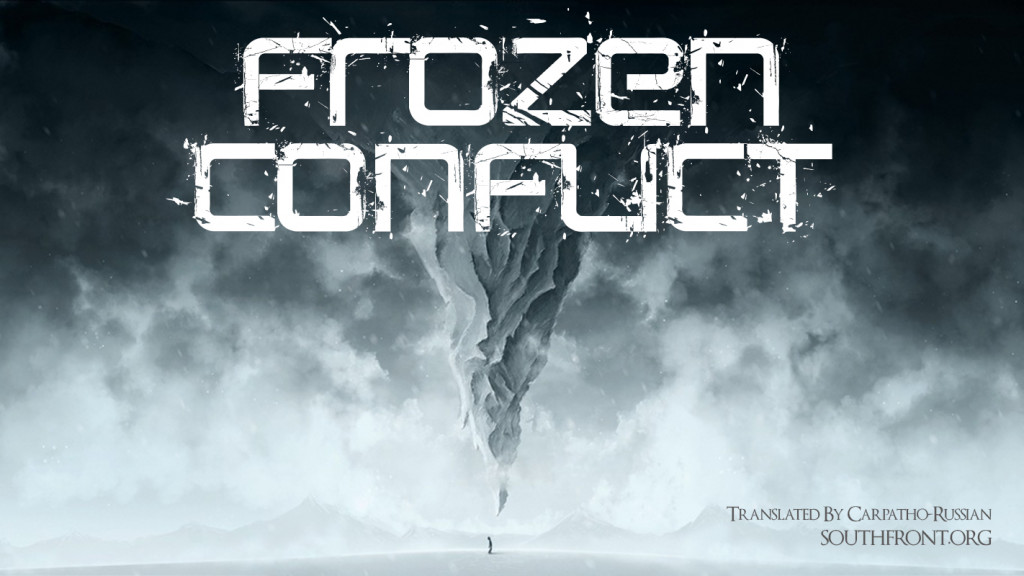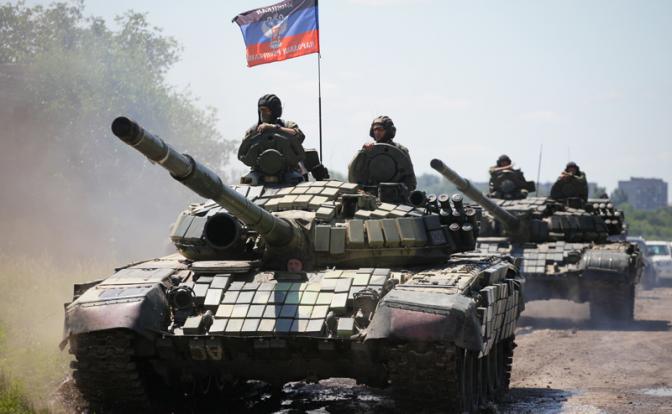Is the “frozen conflict” at the boundaries favorable for Russia?

Originally appeared at Svpressa, translated by Carpatho-Russian exclusively for SouthFront
The head of the Donetsk National Republic (DNR) Alexander Zakharchenko on Wednesday September 30 placed his signature on the document to withdraw arms of caliber less than 100 mm.
“Zakharchenko signed the supplementary agreement to a package of measures, concerning withdrawal of armaments of caliber less than 100 mm”, as reported by a source in Zakharchenko’s circle, to Interfax.
Before this, the tripartite contact group in Minsk on Tuesday evening signed an agreement regarding withdrawal from the contact line of armaments of caliber less than 100 mm.
It is necessary to say that the parties were not able to conclude specifically this agreement.
By the way, data from a fresh poll by the All-Russia Public Opinion Research Center [VtsIOM] stands out, according to which 74% of respondents are convinced that is in Russia’s interest for peace talks and conflict freezing, even by means of concessions and financial losses. The number of those has increased by 9% since January 2015. 10% of Russians would choose the “war to the end” option, at times with the price of human victims, for prompt resolution of the conflict.
From the above, the conclusion arises: most likely, the option of converting Donbass to a second Transnistria with a “frozen” conflict and status, is becoming more and more a pressing question.
– “I do not exclude the concept that the option of a “second Transnistria” is prepared for Donbass”, says the Dean of the Department of Sociology and Political Science of the Financial University for the government of the Russian Federation, Alexander Shatilov. “However, the situation here is more complex, than at the time [early 1990s] in Moldova. The LNR and DNR will always remain irritants for Kiev. Therefore it is not excluded that the Ukrainian army will try to strike a powerful unexpected blow at one stroke to solve the problem of “separatists”. As it was at the time [1995] in Serbian Krajina. However, unlike this [Serbian] republic, Donbass can always count, at least, on an inflow of volunteers from Russia. And it will be difficult to deal with this. And if Kiev decides on sudden aggression, then the option of what was carried out at the time in South Ossetia [2008] is possible also — Russia recognized the independence of this republic after Saakashvili’s aggression.
“Now Kiev, probably due to input from its trans-Atlantic curators, has decided not to be put at risk yet, and is emphasizing the economic suffocation of Donbass. Although this will hardly be possible until Ukraine controls the border between Russia and Novorossiya.
“Most likely, Kiev will pursue a two-track policy: on one hand, to complicate the life of the Donbass republics in every possible way. On the other hand, to attempt to carry out the tactics of weak reintegration. In this, it will rely on the support of the pro-Western section of the Russian elite. Specifically, this section will convince Vladimir Putin that it is necessary to observe the Minsk agreements, that Russia more than once declared support for the territorial integrity of Ukraine, and that it is necessary to answer for its words, etc.
“However, in my opinion, Russia is not prepared to agree on the consequent reintegration of Donetsk and Lugansk into the Ukrainian state. At least, until Kiev recognizes the leaders of the Donbass republics, and concludes laws on LNR and DNR status with them.
“Most likely, the lukewarm conflict will continue. Here, the status of the DNR and LNR will be lower than that of the Transnistria Moldavian Republic. There is a Russian military base in the TMR. The republic issues its own currency. It also has other incontestable marks of statehood. This republic is, so to speak, “semi-recognized” by Russia.
“In Donbass the situation of “neither war nor peace” will most likely last until one of the parties breaks the fragile equilibrium.“

“SP” [SvPressa.ru]: – The combined population of the Donetsk and Lugansk national republics exceeds by several times the TMR population. There are many industrial enterprises and working mines. Why would the DNR and LNR, after enjoying relative peace if it comes, not try to build their own statehood further?
– “I think that statehood will be built gradually. But some powerful factors are interfering. In particular, the oligarch Rinat Ahmetov factor. The Kremlin views this as the lesser of the evils in the Ukrainian establishment. In my opinion, this is a groundless point of view. Ahmetov is as much a double-faced and unreliable “partner”, as is most of the current Ukrainian elite. Ahmetov is trying to keep the authority under his control in the DNR and LNR, and to influence the heads of the republics, Alexander Zakharchenko and Igor Plotnitsky. At least, Alexander Khodakovsky and Denis Pushilin, undoubtedly, are Ahmetov’s people.
“Another factor is the discontent of a considerable proportion of the Russian elite with involvement in a civil war in Ukraine. Liberals in the Russian power consider that it is necessary to “merge” the Donbass republics in a weak form. Well, there are also forces in the Russian establishment who consider that the present standing of Donbass is optimum for Russia. Since, without formally being independent states, the LNR and DNR do not provide Ukraine the opportunity to decisively leave for the West and NATO.”
“SP”: – Why, in your opinion, does the greater part of the Russians surveyed by the All-Russia Public Opinion Research Center consider that it is in the interests of Russia to freeze the conflict in Donbass, even at the price of sanctions and financial losses? And here, the number of such respondents grows.
– “In this case, the answers of Russians reflect the point of view of the majority of the Russian elite, who by a majority advance the strengthening of confrontation with the West for the sake of advancing the Novorossiya project. To a great extent, this project has now been curtailed. And the inhabitants who are far away from policy, are beginning, unfortunately, to again adhere to the timid principle “if only there were no war”. Even though it is precisely the surrender of national interests that leads most often to major war.“
– “There actually are analogies to Transnistria”, says the deputy director of Institute of CIS countries Vladimirs Zharikhin. “The military points of the Minsk agreements are partially fulfilled — not immediately, but shooting has almost ceased. There is a gradual withdrawal of armaments.”
“As pertains to the economic and political points of the Minsk agreements, they are, essentially, ignored by the Kiev side. And after all these agreements actually signify the gradual reintegration of the DNR and LNR into Ukraine. From the point of view of economics, to the contrary, what is taking place is rejection of Donbass from Ukraine, and an economic blockade. And in the political plan, both sides carry out agreements as the fancy strikes them, without agreeing with each other.”
“SP”: – Why do the majority of Russians support concessions to the West and freezing the conflict?
– “Regarding geopolitical decisions, society most often begins with the concept “we are for peace”. In fact, for the ordinary person far from events in Donbass, there is one guidepost: “if only there were peace”. And here the policies must define the path to peace, since some alternative peace leads to yet more war in the future, as we know from the example of the First World War.”
“SP”: – And are the interests of Russia answered by freezing the conflict?
– “No. Complete implementation of the Minsk agreements is in Russia’s interests. Since our country will be perpetually and groundlessly charged with violation of these agreements during a frozen conflict (even though we are not party to the conflict), and under this pretext sanctions will be endlessly prolonged or even new ones introduced. It is in our interests to execute the Minsk agreements so that Donbass might gain the maximum autonomy and that its interests be observed.”



